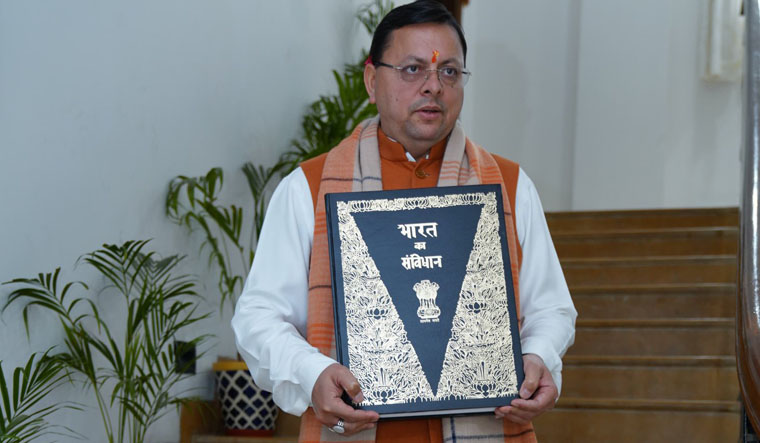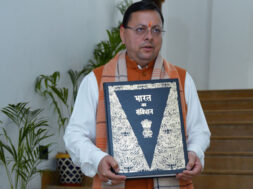
Uttarakhand Tables UCC Bill, a Common Law on Marriage, Divorce, Land, Property and Inheritance for All
Manas Dasgupta
NEW DELHI, Feb 6: The Uttarakhand government on Tuesday tabled in the state Assembly the long-awaited the Uniform Civil Code (UCC) bill which when passed will be the first such legislation to be implemented in any State in the country after Independence.
The bill introduced by the chief minister Pushkar Singh Dhami proposes a common law on marriage, divorce, land, property and inheritance for all citizens irrespective of their religion in Uttarakhand, excluding the Scheduled Tribes.
Mr Dhami, at the forefront of this move, said the proposed UCC will not only be “for the good of all sections” but also align with Prime Minister Narendra Modi’s vision of ‘Sab ka Saath, Sab ka Vikas’ and ‘Ek Bharat, Sreshtha Bharat.’
The bill stipulates registration of live-in relationships in the state and imprisonment of minimum of three months for failure to do so within a month. Any child born out of such a relationship will be considered legitimate.
A government-appointed panel, led by retired Supreme Court judge Ranjana Prakash Desai, has drafted a four-volume, 749-page report containing several recommendations. The panel collected 2.33 lakh pieces of written feedback online and organised more than 70 public forums. During these meetings, panel members engaged with roughly 60,000 people to help develop the draft.
Among the many proposals in the UCC are a complete ban on polygamy and child marriage, a standardised marriageable age for girls across all faiths, and a uniform process for divorce. These recommendations, aimed at fostering gender equality and social cohesion, are set to be deliberated upon during the special four-day assembly session which began on Monday and will continue till Thursday.
The UCC bill also seeks to ban practices like ‘halala‘ and ‘iddat‘, which are the Islamic practices a woman must go through after a divorce or the death of the husband. The All India Muslim Personal Law Board (AIMPLB) has strongly objected to the move of the BJP-led government in Uttarakhand charging that the proposed legislation targeted the identity of the Muslim community besides inflicting damage on the country’s diversity.
Passing a legislation on the UCC will fulfil a major promise made by the BJP to the people of the state in the run-up to the 2022 Assembly polls, which saw the saffron party storm to power with a landslide victory for the second consecutive term. Several BJP ruled States in the country, including Gujarat and Assam, have expressed their keenness to follow the Uttarakhand UCC as a model.
As per the Uttarakhand UCC bill, individuals in, or planning to enter, live-in relationships in the state must register themselves with district officials with parental consent required for those below the age of 21 who wish to live together. Mandatory registration of such relationships extends to individuals who “any resident of Uttarakhand… in a live-in relationship outside the State.” Live-in relationship will not be registered in cases that are “against public policy and morality,” if one partner is married or in another relationship, if one partner is a minor, and if consent of one partner was obtained by “coercion, fraud, or misrepresentation (with regard to identity)”.
A senior official said a website was being prepped to accept details of live-in relationship, which would be verified with the District Registrar, who will conduct a “summary inquiry” to establish the validity of the relationship. To do so, he may summon either or both partners, or anybody else. Should registration be refused, the Registrar must inform in writing his/her reasons.
The “termination” of registered live-in relationships requires a written statement, in a “prescribed format” that can invite police investigation if the Registrar feels reasons for the relationship ending are “incorrect” or “suspicious.” Parents or guardians of those under 21 will also be informed.
Failure to submit live-in relationship declarations, or providing false information, could land one in jail for three months, a fine of ₹ 25,000, or both. Anyone who fails to register a live-in relationship will face a maximum of six months in jail, be fined ₹ 25,000, or both. Even a delay in registration, by as little as a month, will trigger a jail term of up to three months, a fine of ₹ 10,000, or both.
Among other key points in the section on live-in relationships in the UCC are that children born out of live-in relationships will receive legal recognition; i.e., they “shall be a legitimate child of the couple” meaning that “rights of all children born out of wedlock, in live-in relationships, or via incubation, will be the same… no child can be defined as ‘illegitimate.’ Also, “all children will have equal rights in inheritance (including parental property).” The UCC refers all as “child” and not “son” or “daughter.”
The UCC draft encompasses various facets of civil life, with recommendations extending to inheritance rights, mandatory marriage registration, and an increased marriageable age for girls, facilitating their pursuit of education before marriage. Additionally, couples failing to register their marriages will be ineligible for government facilities, in what is being seen as a push for legal documentation.
While the specifics of the draft remain undisclosed to the public, reports suggest that it will establish a legal framework encompassing marriage, divorce, land, property, and inheritance laws, irrespective of religious affiliations. If enacted, Uttarakhand will become the first state in post-Independence India to adopt the UCC, following in the footsteps of Goa, where it has been operational since the days of Portuguese rule.
The proposed UCC for Uttarakhand goes beyond religious boundaries, granting adoption rights to everyone, including Muslim women. It seeks to ban practices such as halala and iddat, promote the declaration of live-in relationships, and simplify adoption procedures.
The practice of iddat has been at the centre of Pakistan politics recently, with its jailed former prime minister Imran Khan’s wife Bushra Khan accused of not completing the waiting period after divorcing her previous husband and marrying Khan in 2018.
Once the proposed UCC is in place, live-in relationships will have to be registered under law. Legal experts claim that registration of such relationships would benefit both men and women. “False cases registered by women would also come down. Legal sanctity would now be there in such cases,” former DGP of Uttarakhand Ashok Kumar said. The draft excludes population control measures and the Scheduled Tribes, constituting 3 per cent of Uttarakhand’s population.
Other key features of the UCC include equal property rights for sons and daughters, elimination of distinctions between legitimate and illegitimate children, and equal treatment for adopted and biologically born children. In the event of a person’s death, the proposed UCC ensures equal property rights for the spouse, children, and parents, a departure from previous laws that limited such rights.
A woman “deserted by her live-in partner” can claim maintenance, the UCC draft also said, although it did not specify what constitutes “desertion.” A Uniform Civil Code refers to a set of laws applicable to all citizens, and is not based on religion when dealing with marriage, divorce, inheritance, and adoption, among other personal matters.
Treasury benches welcomed the tabling of the bill with thumping of desks and chants of “Bharat Mata Ki Jai,” “Vande Mataram” and “Jai Shri Ram.” The original list of business for the day stated the bill was to be debated and passed the same day but Speaker Ritu Khanduri amended it conceding the demands of the opposition members who wanted more time to study the bill and present their views on it. Before the bill was tabled, there were protests inside the House by opposition members who said they were not given time to study its provisions.
“It seems the government wants to pass the bill without a debate in violation of the legislative traditions,” Leader of Opposition Yashpal Arya said. Slogans were also raised by the opposition members, who were pacified after the Speaker assured them that they would get enough time to study the bill.
The bill applies to the whole of Uttarakhand and also to people from the State who reside outside its territories. However, the Scheduled Tribes have been left out of the ambit of the bill. “Nothing contained in this code shall apply to the members of any Scheduled Tribes…. and the persons and group of persons whose customary rights are protected under the Part XXI of the Constitution of India,” the bill states. It will come into force from the date it is notified in the gazette. The ongoing session of the State Assembly was convened especially for the passage of the UCC bill.
Commenting on the Dhami government’s move, AIMPLB spokesperson Syed Qasim Rasool Ilyas said, “We are protesting UCC. This UCC is against the diversity of the country. This is the country of different religions, culture and different languages and we have accepted that diversity. If you try to implement such a Uniform Civil Code, then you are causing a damage to that diversity.”
Ilyas also said, “Secondly, you are forcing a majoritarian point of view on everyone. You have drafted the UCC considering a particular Hindu religion and imposing it on everyone.” He asked if tribals have been exempted from the UCC, why the same yardstick cannot be applied to Muslims too? The AIMPLB spokesperson said the UCC Bill’s provisions would clash with the Muslim religious laws or personal laws, which are derived from the holy Quran.
“An optional Uniform Civil Code already exists. There are Special Marriage Act and Succession Act. Anyone who does not want to get governed by religious laws, that couple can get married under Special Marriage Act. Religious personal law will not be applicable on that particular couple. They will be governed by secular law. When optional UCC is available, then why there is need of new UCC from the government?” he asked.
Ilyas alleged that the government’s objective behind bringing UCC was to affect the identity of Muslims. “Muslim’s identity is governed by religion. Religious identity is defined by religious laws. If you finish their religious laws, their religious identity will get finished.” Ilyas said the AIMPLB’s legal committee was studying the provisions of Uttarakhand’s UCC Bill and that the Board would explore options to seek legal remedies as per the advice of this panel.













